- Majority (89%) think that Russia is responsible for the military hostilities/ war in Ukraine.
- When it comes to efforts made to stop war, perception is poor for all countries except Ukraine. Majority feel Russia (83%) & China (69%) are not doing enough to help stop the war.
- Over 1 in 3 believe that the military hostilities/ war in Ukraine will end at some point this year in 2022.
- Over 1 in 3 Irish would be willing to fight for their country if there were a war involving Ireland.
- Confidence in information about the war provided by the media (63%) & the authorities (60%) is strong in Ireland.
- Confidence on the economic situation of the country (34%) & personal household (38%) is weak.
WIN International, the world’s leading association in market research and polling has published a recent survey exploring the views and beliefs of 19,422 individuals among citizens from 24 countries across the globe about war and attitudes towards it. The survey analyses the current views and opinions related to the perception of war & safety.
HEADLINES – IRELAND
War between Russia and Ukraine
- Overwhelming majority of 89% believe that Russia is responsible for the military hostilities/ war in Ukraine.
- Irish perception about blame on Russia is very high & much higher than the global average of 64%.
- In terms of countries doing enough to help stop the war, the views are negative for all except Ukraine. People in Ireland think that countries are currently not doing enough on their end; Russia (83%), China (69%), NATO (46%), USA (44%), EU (38%).
- The negative outlook towards Russia & China is much more prevalent in Ireland than on average across the globe.
- The view on ending of war is also pessimist with only 1 in 3 thinking that the war will come to an end within 2022. 1 in 3 believe it will last longer, while 1 in 3 claim to not know.
- Ireland is at par with the global thought on this measure.
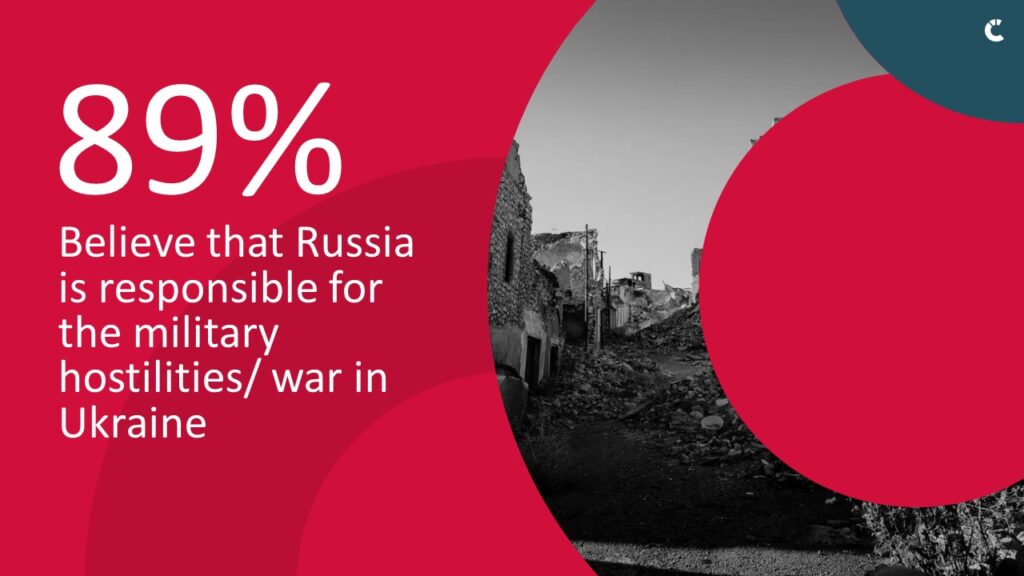
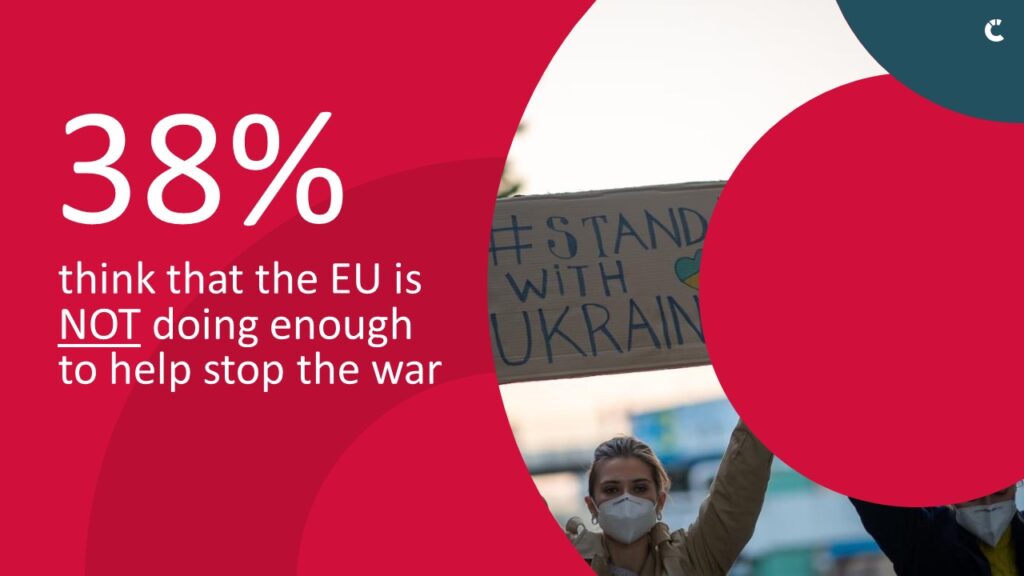
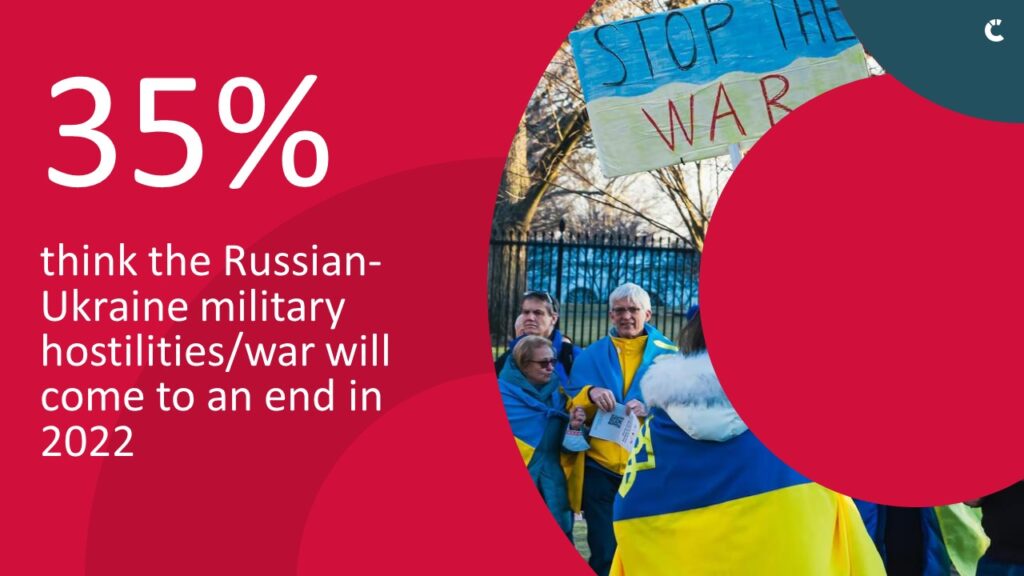
Willingness to fight for one’s own country
- Over 1 in 3 state willingness to fight for Ireland if there were a war involved.
- The agreement is higher among males than females
- Globally, Irish readiness to fight for their country is lower (-10%) than the average, but remains at the highest levels of fighting willingness compared to other European countries.
- Poignantly, those living in former Axis countries of Japan (19%), Germany (22%), and Italy (22%) express some of the lowest level of willingness to fight for their country in the event of a war, with only the Netherlands (16%) expressing lower level of willingness.
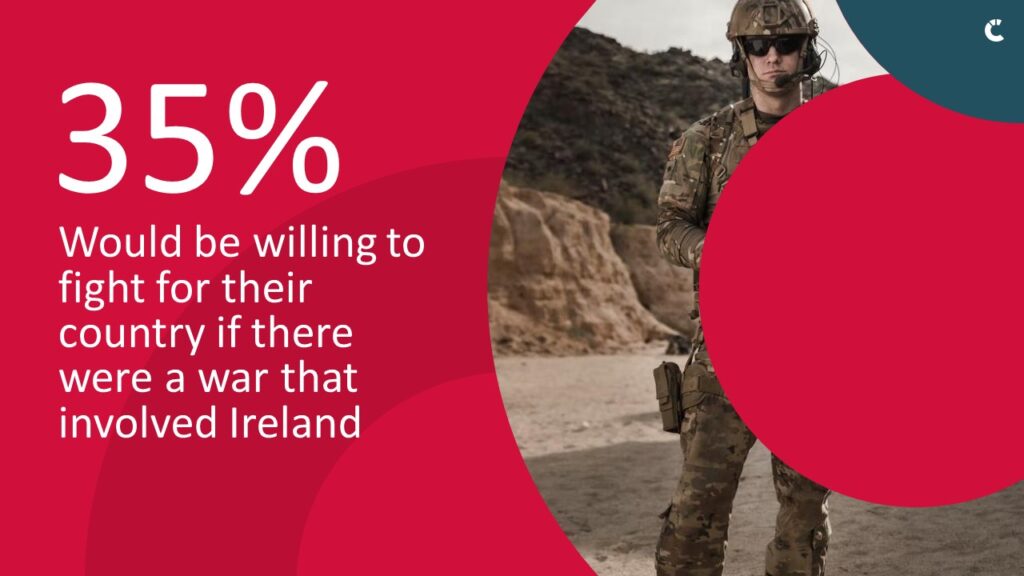
Confidence and the future
- Irish state high confidence in information received about the Russian-Ukraine hostilities/war from the media (63%) & the authorities (60%).
- Assurance on information sources is much better in Ireland than global average.
- However, some tension is observed when it comes to confidence in the economic situation of Ireland & one’s household in the coming months. Only 1 in 3 state some confidence on the national economic situation, with just under 2 in 5 confident with one’s own household economic situation.
- Compared to the global average, the Irish are more confident in their country’s economic situation, but less confident than the average with regard to their own household’s economic situation.
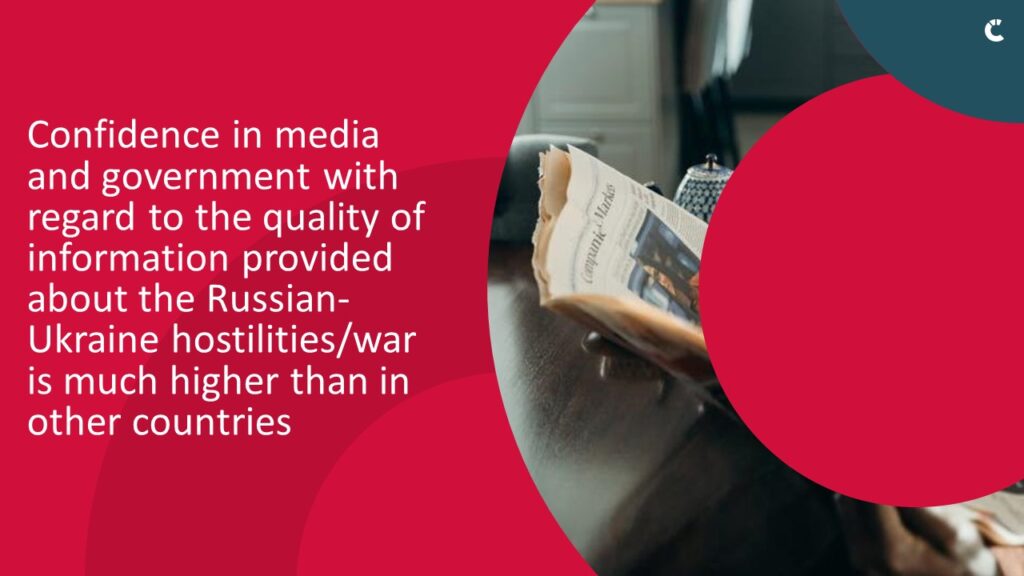
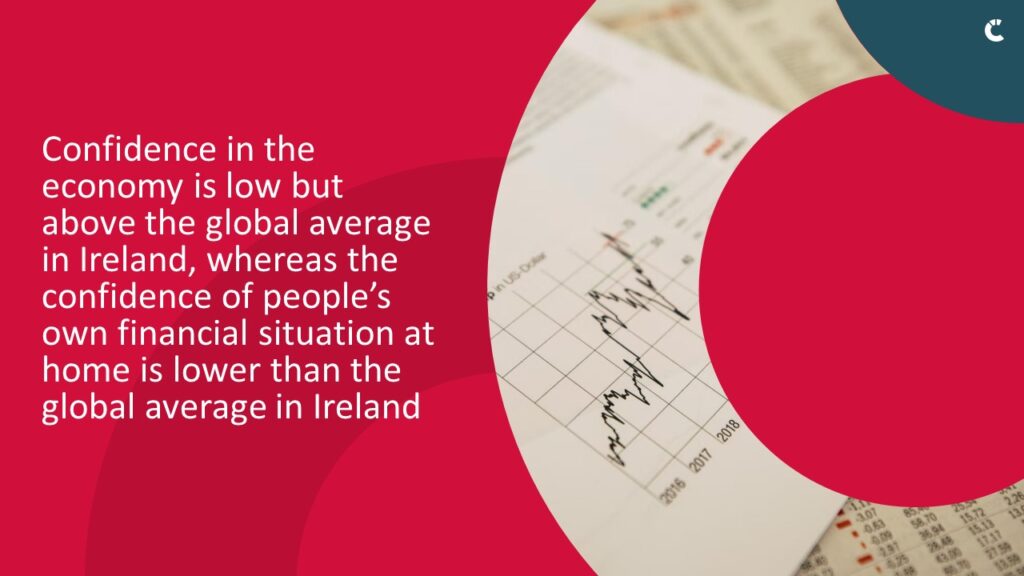
HEADLINES WORLD
Willingness to fight for one’s own country
- Connection to ones’ own country does not seem to be enough to fight for it. If there were a war that involved their country, only 45% would be willing to fight for it. Europe shows the highest percentage of people that won´t fight for their country, 38% compared to the 33% that will fight. Pakistan, consistent to its citizens’ deep connection to it, presents the highest percentage (96%) of people willing to defend their country in case of war. Italy (22%), Germany (22%), Japan (19%) and Netherlands (16%) are the countries where less people are willing to get involved in a war.
War between Russia and Ukraine
- Almost two thirds of the population (64%) in the 24 countries surveyed consider that Russia is responsible for the military hostilities/war in Ukraine. This perception varies among regions: while the majority in Europe (75%), the Americas (65%), APAC (63%) and Africa (56%) blame Russia, in MENA region opinions are more distributed, with 30% considering Russia and 26% USA the responsible of the war. On the other hand, only Ukraine is perceived as the one doing enough to help stopping the war. Indeed, respondents believe Russia, NATO, China, USA and European countries are not doing all they can to end the conflict (67%, 55%, 46%, 45% and 42% respectively). Overall, 35% think that the war will come to an end during this year.
Confidence and the future
- The future looks uncertain for 55% of interviewees who feel insecure about their own. Lebanon (78%), Italy (68%) and France (67%) are the countries with the highest percentage of citizens feeling insecure.
- However, large shares of the population seem to be confident about different aspects: for example, results show some confidence in the quality of information people find about the Russian-Ukraine hostilities/war in the media in their country (44%), the economic situation of their household in the coming months (44%), the quality of information people receive about the Russian-Ukraine hostilities/war from public authorities in their country (40%) and the economic situation in their country (29%).
Vilma Scarpino, President of WIN International Association, said:
“Results of the survey we conducted bring the opinions about real-time events like war, to broader societal, economical and political considerations. The war between Russia and Ukraine, just like other wars in different parts of the world, shakes people’s confidence about the future and weakens perspectives: indeed, only a few believe this conflict will know an end before 2022.. However, instead of turning skeptical about different aspects of their life, many keep focusing on the positive ones: large shares of the population trust the media and the authorities when it comes to quality of information, and many others do not loose hopes about the economic situation, both of their households and of their country, even though there are differences between countries.
Moreover, the majority of the population scores positive on a mood scale and are happy to live in their own countries. Of course, people who feel less connected to the place they live in are also the most unhappy ones. Interestingly, (and that’s where culture kicks in the most), deeper connections to your country do not always mean higher willingness to fight for it. On one hand, many consider war as the ultimate way to defend their places (whether you want to, or need to), but many others just see it as an extreme and absolutely avoidable situation they’re not willing to live. “
-ENDS-
Media enquiries:
IRELAND DATA
Richard Colwell, C.E.O., RED C Research
Derek Bell, Project Manager, RED C Research
+35318186316
[email protected]
WORLDWIDE DATA
Elena Crosilla, WIN Coordinator
+39 335.62.07.347
E-mail: [email protected]
NOTES FOR EDITORS
Methodology:
The survey was conducted in 24 countries using CAWI / online / face to face survey methods.
Sample Size and Mode of Field Work:
A total of 19,422 people were interviewed. See below for sample details. The fieldwork was conducted during April 1st and May 5th, 2022. The margin of error for the survey is between 4.4 and 2.2 at 95% confidence level.
The global average has been computed according to the covered adult population of the surveyed countries.
In Ireland, a representative sample of over 1,015 adults were conducted online. Fieldwork was conducted in April 2022.
Download the reports below:
WIN World Survey – War & Safety- Press Release
WIN World Survey – Safety & War – Irish Summary Results
